Central Eurasian Economic Area, Iran

Islamic Civilization: Central Eurasian Economic Area, Turkey, Pakistan
- Introduction to the Central Eurasian Economic Area as a part of the Islamic Civilization
- Islam as the unifying factor of the Central Eurasian Economic Area
- Economic Profile of the Central Eurasian Countries
- Businesspeople of the Central Eurasian Economic Area
- Interactions of the Central Eurasian Economic Area with the other economic areas
- Economic Institutions related to the Central Eurasian Economic Area
The objectives of the subject “Central Eurasian Economic Area” are the following:
- To define the economic characteristics of the Economic Area of Eurasia Central
- To understand the influence of Islam on the Central Eurasian Economic Area
- To know the economic profile of the countries of Central Eurasia
- To understand the economic integration process in the Central Eurasian Economic Area
- To analyze the main Businesspeople in Central Eurasia
- To explore the economic relationships with the others economic areas of different civilizations
- To analyze the economic institutions related to the Central Eurasian Economic Area
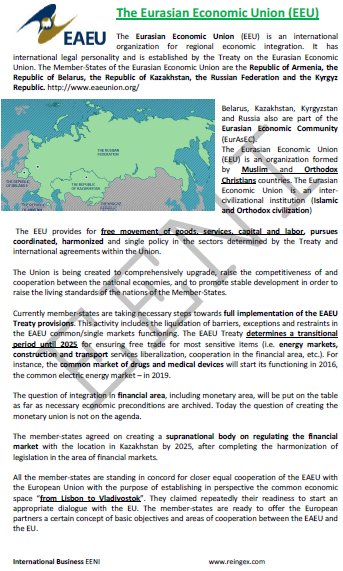

The Subject “Central Eurasian Economic Area” belongs to the following Online Programs taught by EENI Global Business School:

Doctorate: Ethics, Religions & Business, Islamic Business, World Trade.
Masters: International Business, Foreign Trade, Religions & Business.
Download the Syllabus of the Subject “Central Eurasian Economic Area” (PDF).
Languages of study: or
or  Espace économique de l’Eurasie centrale
Espace économique de l’Eurasie centrale  Espacio Eurasia
Espacio Eurasia  Eurásia.
Eurásia.
- Credits of the Subject “Central Eurasian Economic Area”: 2

- Duration: two weeks
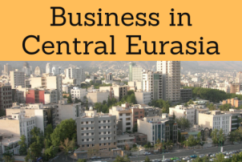
Masters adapted to the Eurasian Students:  Azerbaijan,
Azerbaijan,
 Turkey,
Turkey,
 Kazakhstan,
Kazakhstan,
 Kyrgyzstan,
Kyrgyzstan,
 Tajikistan,
Tajikistan,
 Turkmenistan, and
Turkmenistan, and  Uzbekistan.
Uzbekistan.
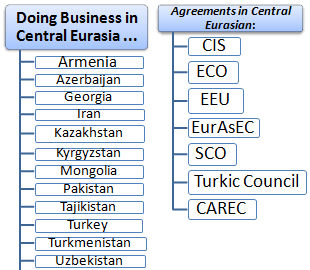
Central Eurasian Economic Area.
The Central Eurasian Economic Area consists of eleven countries: Afghanistan, Azerbaijan, Albania, Iran, Kazakhstan, Kyrgyzstan, Pakistan, Tajikistan, Turkmenistan, Turkey, and Uzbekistan.
Furthermore, Bangladesh and the Maldives are included because of their growing economic integration in the region.
- Islam is the main religion in the Central Eurasian Economic Area
- There are Orthodox Christian minorities
- This economic area covers European and the Asian Countries
- The largest economies are Turkey, Iran, and Pakistan. These three countries are trying to be the Central State
- All the Central Eurasian Countries were former colonies (Soviet Union, UK)
- Pakistan was a part of India until the partition (1947)
The main Businesspeople in the Central Eurasian Economic Area are Muhammad Yunus, Mian Muhammad Mansha, Salman F Rahman, Dewan Yousuf Farooqui, Muhammad Abdul Mannan.
- The case of Iran:

Integration in the Islamic Economic Area of Central Eurasia.
- Kazakhstan and Kyrgyzstan belong to the Eurasian Economic Union (with Armenia, Belarus, and Russia). The EEU has a Trade Agreement with Azerbaijan
- Afghanistan, Azerbaijan, Iran, Kazakhstan, Kyrgyzstan, Pakistan, Tajikistan, Turkey, Turkmenistan, and Uzbekistan are part of the Economic Cooperation Organization (ECO)
- Azerbaijan, Kazakhstan, Kyrgyzstan, Tajikistan, Turkmenistan, and Uzbekistan are members of the Commonwealth of Independent States (with Armenia, Russia, Belarus, Moldova, and Ukraine)
- Kazakhstan, Kyrgyzstan, Tajikistan, and Uzbekistan are members of the Shanghai Cooperation Organization (with Russia and China)
- Bangladesh, Iran, the Maldives, and Pakistan are members of the Asian Clearing Union (with Bhutan, India, Myanmar, Nepal, and Sri Lanka)
- Afghanistan, Bangladesh, the Maldives, and Pakistan are members of the South Asian Association for Regional Cooperation (with Bhutan, India, Nepal, and Sri Lanka. Iran is an observer country) and the SAARC Preferential Trade Arrangement (SAPTA)
- Afghanistan, Azerbaijan, Kazakhstan, Kyrgyzstan, Pakistan, Tajikistan, Turkmenistan, and Uzbekistan are members of the Central Asia Cooperation (CAREC) (with China and Mongolia)
- Bangladesh and the Maldives are members of the South Asia Economic Cooperation (SASEC) (with Bhutan, India, Nepal, and Sri Lanka)
- Azerbaijan, Kazakhstan, Kyrgyzstan, and Turkey are part of the Turkic Council
- Afghanistan, Kyrgyzstan, Pakistan, and Tajikistan belongs to Regional Electricity Market Central Asia - South Asia
- Pakistan has trade agreements with Iran and Bangladesh and has signed an Agreement on Economic Cooperation with Kyrgyzstan
- Kyrgyzstan has trade agreements with Kazakhstan and Uzbekistan
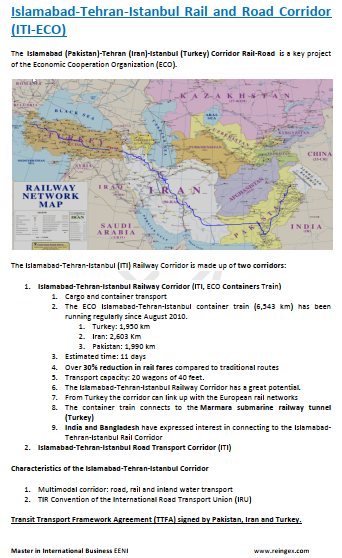
All the Eurasian Muslim Countries are part of the Trade Preferential System (OIC-TPS).
- The Eurasian countries that have signed the Framework Agreement + PRETAS + Rules of Origin are Bangladesh, Pakistan, and Turkey
- Only Iran has signed the Framework Agreement + PRETAS
- The Maldives has signed only the Framework Agreement of the Trade Preferential System
- Afghanistan, Azerbaijan, Kazakhstan, Kyrgyzstan, Tajikistan, Turkmenistan, and Uzbekistan do not yet benefit from the Trade Preferential System of the OIC

- Almaty-Bishkek Corridor
- Bangladesh-Myanmar Corridor
- China-Pakistan Corridor
- China-Central-West Asia Corridor
- Europe-Caucasus-Asia Corridor
Trade Agreements and economic Institutions covering all the Islamic Economic Areas.
- Trade Agreements and Economic Institutions;
- No country in the region is a member of the Arab League, and therefore, they are not members of the Greater Arab Free-Trade Area (GAFTA)
- Turkey belongs to the Euro-Mediterranean Partnership
- Bangladesh and Iran are members of the Indian-Ocean Rim Association (with others African and Asian Countries)
- Trade Agreements between the Muslim Countries:
Economic Organizations related to the Central Eurasian Economic Area.
All the countries with Muslim majorities of Central Eurasia are members of:
- Organization of Islamic Cooperation and therefore its affiliated institutions;
- Islamic Development Bank
- Asian Development Bank
- ESCAP
- Colombo Plan
- Africa-Asia Strategic Partnership
- Bangladesh, Iran, Kazakhstan, Kyrgyzstan, Pakistan, Tajikistan, Turkmenistan, and Uzbekistan are members of the Boao Forum for Asia (BOAO)
- Afghanistan, Bangladesh, Iran, Iraq, Kazakhstan, Kyrgyzstan, the Maldives, Pakistan, Tajikistan, Turkmenistan, and Uzbekistan are members of the Asia-Middle East Dialogue (AMED)
- Bangladesh, Iran, Kazakhstan, Pakistan, Tajikistan, and Uzbekistan are members of the Asia Cooperation Dialogue (ACD)
- Organization for Cooperation between Railways (OSJD)
All the countries in the region are beneficiaries of the Arab Development Funds.
Interactions of the Central Eurasian Islamic Economic Area with the Western Civilization.
- With the European
Economic Area
- European Union
- Turkey has a Customs Union with the EU
- Afghanistan and Bangladesh are members of the Generalized System of Preferences. Pakistan and Turkmenistan are beneficiaries of the SGP+
- Armenia is a member of the relations European Union-South Caucasus and the European Neighborhood Policy
- Azerbaijan, Bangladesh, and Pakistan are beneficiaries of the European Investment Bank
- Armenia, Azerbaijan are partners of the Eastern Partnership of the EU
- Azerbaijan, Kazakhstan, Kyrgyzstan, Tajikistan, Turkey, Turkmenistan, and Uzbekistan are members of the UNECE
- Turkey has a Trade Agreement with the EFTA
- European Union
- With the American Economic Area
Interactions of the Central Eurasian Islamic Economic Area with the African Civilization.
- All the countries of Central Eurasia are part of the Africa-Turkey Partnership
- Asia-Africa Corridor
- Pakistan has a Preferential Trade Area with Mauritius
Interactions of the Central Eurasian Islamic Economic Area with the Hindu Civilization.
- India has a Free Trade Agreements with Pakistan and the Maldives
- Bangladesh has an agreement with Nepal
Interactions of the Central Eurasian Islamic Economic Area with the Orthodox Civilization.
- Iran has a Trade Agreement with Armenia
- Azerbaijan:
- Azerbaijan and Turkey are members of the Black Sea Cooperation (Albania, Armenia, Bulgaria, Georgia, Greece, Moldova, Romania, Russia, and Ukraine) and the Black Sea Synergy (Armenia, Georgia, Moldova, Russia, and Ukraine)
- Kyrgyzstan has trade agreements with Armenia, Moldova, Russia, and Ukraine
- Tajikistan has Trade Agreements with Armenia and Ukraine
- Turkmenistan has Trade Agreements with Armenia, Georgia, and Ukraine
- Turkey has Trade Agreements with Macedonia, Bosnia and Herzegovina, and Georgia
Interactions of the Central Eurasian Islamic Economic Area with the Buddhist Civilization.
- Pakistan has a Trade Agreement with Sri Lanka
- Bangladesh has an agreement with Sri Lanka
Interactions of the Central Eurasian Islamic Economic Area with the Sinic Civilization.
- Pakistan has a Trade Agreement with China
Inter-civilization Agreements of the Central Eurasian Economic Area.
- Pakistan has an agreement with the ASEAN
- Bangladesh is a member of:
- SAARC (India, Myanmar, Sri Lanka, Thailand, Bhutan, and Nepal)
- Asia-Pacific Trade Agreement (China, India, South Korea, Laos, Sri Lanka, and Mongolia)
- Azerbaijan, Kazakhstan, Kyrgyzstan, Mongolia, Tajikistan, Turkmenistan, and Uzbekistan are members of the Organization for Security and Cooperation in Europe (OSCE)
- Turkey has a Trade Agreement with Israel
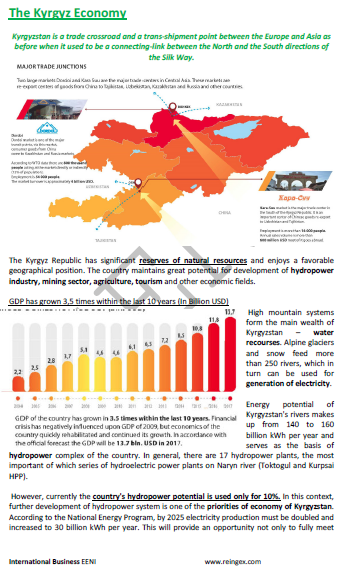
(c) EENI Global Business School (1995-2024)
We do not use cookies
Top of this page



